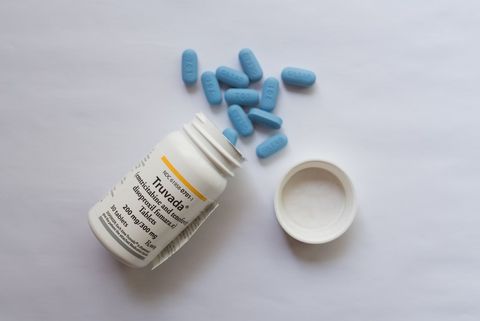
HIV Survivors Experience Bone and
Kidney Complications from Taking Truvada
1-800-LAW-FIRM is reviewing claims that Truvada and other drugs that contain the active ingredient tenofovir disoproxil fumarate (TDF) can cause bone and kidney disease when taken in high doses. Unfortunately, that is how Truvada users must take the drug because it is not effective in low amounts. People taking the medication may end up with severe kidney and bone complications. Contact our team by filling out the form for a no-obligation, free claim review.
FREE CLAIM REVIEW

What is the lawsuit against Truvada?
According to lawsuits filed against Gilead Sciences, Inc., the pharmaceutical company was aware of the severe health risks Truvada posed to HIV patients but failed to disclose them to the public. The lawsuits focus on two components:
1. Failure to warn and Defective design claims
The bulk of the lawsuits deals with the claim that Gilead knew that Truvada carried serious design defects that – in turn – cause severe side effects. Gilead also failed adequately to warn doctors or patients of those risks in its disclaimers.
Each lawsuit claims that Gilead knew that the drug TDF was very toxic in the prescribed doses. The company even sought a safer version of it right after TDF was approved as an oral medication by the U.S. Food and Drug Administration (FDA) in 2001. Nevertheless, Gilead continued to tout TDF and Truvada as “risk-free.”
2. Claims that Gilead withheld a safer drug
The lawsuits also allege that Truvada manufacturer Gilead concealed the development of another drug, tenofovir alafenamide (TAF).
The body absorbs TAF better than TDF. This makes TAF more efficacious at significantly lower doses. Gilead had been investigating TAF even before Truvada gained approval in 2004. Those studies revealed that TAF was far less toxic and that TDF carried a greater risk profile.
However, TDF had only recently received a patent. It still had years of protection against generic brands. TDF was also the dominant drug in HIV treatment. This allowed Gilead to charge extremely high prices per dose.
Therefore, rather than release the studies that found TAF was a less toxic alternative to TDF, Gilead covered them up. In 2004, Gilead even announced that it would stop researching TAF. It then promptly applied for and received seven patents related to TAF in the span of the next several months.
Finally, in 2010, the patent on TDF was running out. Gilead announced the discovery of a new drug that would revolutionize HIV treatment – TAF.
All of the Truvada lawsuits across the U.S. are consolidating into a federal MDL out of the Northern District of California. Each plaintiff’s case remains separate, but the MDL – similar to a class action lawsuit – helps to expedite the litigation process and speed up settlements.
What type of injuries are associated with the medication?
Bone diseases linked to Truvada include:
- Osteoporosis (weak and brittle bones)
- Osteopenia (bone loss)
- Osteomalacia (soft bones)
- Osteonecrosis or Avascular Necrosis
- Atraumatic Fracture/Break
Kidney conditions linked to Truvada include:
- Chronic Kidney Disease
- Acute Kidney Injury (AKI)
- Acute Renal Failure
- End Stage Renal Disease (ESRD)
- Renal Insufficiency
- Declining Kidney Function
- Fanconi syndrome
-
Other nephritic conditions
What medications are subject to the litigation?
Truvada, Gilead’s original TDF (tenofovirdisoproxil fumarate) medication for HIV treatment as well as pre-exposure prophylaxis “PrEP” for HIV-negative people.
Atripla, which is for HIV infection treatment, not HIV prevention. Also goes by the name Efavirenz.
Complera, which is for HIV treatment, not prevention. Also goes by the name Rilpivirine.
Stribild, which is used for HIV treatment, not prevention. Also goes by the name Elvitegravir, Cobicistat, and Emtricitabine.
Viread, which treats Hepatitis B in addition to HIV. Also goes by the name Tenofovir DF.
What could a truvada victim recover as part of the litigation?
Ultimately, the amount each plaintiff may settle for depends on their specific case and the extent of their injuries.
Truvada victims may be able to recover the following economic and non-economic damages from Gilead:
- Past and future anticipated costs of medical treatment and other medical expenses
- Loss of past and future earnings from being too ill to work
- Pain and suffering, including mental distress and losing quality of life
- Funeral expenses and loss of support if the victim died (“wrongful death”)